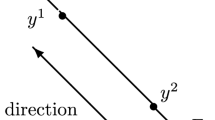Abstract
Magnetohydrodynamics (MHD) studies the dynamics of magnetic fields in electrically conducting fluids. In addition to the sound wave and electromagnetic wave behaviors, magneto-fluids also exhibit an interesting phenomenon: They can produce the Alfvén waves, which were first described in a physics paper by Hannes Alfvén in 1942. Subsequently, Alfvén was awarded the Nobel prize for his fundamental work on MHD with fruitful applications in plasma physics, in particular the discovery of Alfvén waves. This work studies (and constructs) global solutions for the three dimensional incompressible MHD systems (with or without viscosity) in strong magnetic backgrounds. We present a complete and self-contained mathematical proof of the global nonlinear stability of Alfvén waves. Specifically, our results are as follows:
-
We obtain asymptotics for global solutions of the ideal system (i.e.,viscosity \(\mu =0\)) along characteristics; in particular, we have a scattering theory for the system.
-
We construct the global solutions (for small viscosity \(\mu \)) and we show that as \(\mu \rightarrow 0\), the viscous solutions converge in the classical sense to the zero-viscosity solution. Furthermore, we have estimates on the rate of the convergence in terms of \(\mu \).
-
We explain a linear-driving decay mechanism for viscous Alfvén waves with arbitrarily small diffusion. More precisely, for a given solution, we exhibit a time \(T_{n_0}\) (depending on the profile of the datum rather than its energy norm) so that at time \(T_{n_0}\) the \(H^2\)-norm of the solution is small compared to \(\mu \) (therefore the standard perturbation approach can be applied to obtain the convergence to the steady state afterwards).
The results and proofs have the following main features and innovations:
-
We do not assume any symmetry condition on initial data. The size of initial data (and the a priori estimates) does not depend on viscosity \(\mu \). The entire proof is built upon the basic energy identity.
-
The Alfvén waves do not decay in time: the stable mechanism is the separation (geometrically in space) of left- and right-traveling Alfvén waves. The analysis of the nonlinear terms are analogous to the null conditions for non-linear wave equations.
-
We use the (hyperbolic) energy method. In particular, in addition to the use of usual energies, the proof relies heavily on the energy flux through characteristic hypersurfaces.
-
The viscous terms are the most difficult terms since they are not compatible with the hyperbolic approach. We obtain a new class of space-time weighted energy estimates for (weighted) viscous terms. The design of weights is one of the main innovations and it unifies the hyperbolic energy method and the parabolic estimates.
-
The approach is ‘quasi-linear’ in nature rather than a linear perturbation approach: the choices of the coordinate systems, characteristic hypersurfaces, weights and multiplier vector fields depend on the solution itself. Our approach is inspired by Christodoulou–Klainerman’s proof of the nonlinear stability of Minkowski space-time in general relativity.
Similar content being viewed by others
Notes
On \(\mathbb {R}^3\), the Hardy’s inequality is
$$\begin{aligned} \int _{\mathbb {R}^3} \frac{|f(x)|^2}{|x|^2}dx \le 4 \int _{\mathbb {R}^3}|\nabla f(x)|^2dx. \end{aligned}$$
References
Alfvén, H.: Existence of electromagnetic-hydrodynamic waves. Nature 150, 405–406 (1942)
Bardos, C., Sulem, C., Sulem, P.-L.: Longtime dynamics of a conductive fluid in the presence of a strong magnetic field. Trans. Am. Math. Soc. 305(1), 175–191 (1988)
Christodoulou, D., Klainerman, S.: The Global Nonlinear Stability of Minkowski Space, vol. 41. Princeton Mathematical Series, Princeton (1993)
Davidson, P.A.: An Introduction to Magnetohydrodynamics. Cambridge Texts in Applied Mathematics. Cambridge University Press, Cambridge (2001)
Lin, F., Xu, L., Zhang, P.: Global small solutions of 2-D incompressible MHD system. J. Differ. Equ. 259(10), 5440–5485 (2015)
Lindblad, H., Rodnianski, I.: The global stability of Minkowski spac–time in harmonic guage. Ann. Math. (2) 171(3), 1401–1477 (2010)
Schonbek, M.E.: Large time behavior of solutions to the Navier–Stokes equations. Commun. Partial Differ. Equ. 11, 753–763 (1986)
Wiegner, M.: ecay results for weak solutions of the Navier–Stokes equations in \(\mathbb{R}^{n}\). J. Lond. Math. Soc. (2) 35, 303–313 (1987)
Xu, L., Zhang, P.: Global small solutions to three-dimensional incompressible magnetohydrodynamical system. SIAM J. Math. Anal. 47(1), 26–65 (2015)
Author information
Authors and Affiliations
Corresponding author
Additional information
The authors would like to thank Kevin G. Luli for numerous suggestions on improving the manuscript.
Rights and permissions
About this article
Cite this article
He, LB., Xu, L. & Yu, P. On Global Dynamics of Three Dimensional Magnetohydrodynamics: Nonlinear Stability of Alfvén Waves. Ann. PDE 4, 5 (2018). https://doi.org/10.1007/s40818-017-0041-9
Received:
Accepted:
Published:
DOI: https://doi.org/10.1007/s40818-017-0041-9



